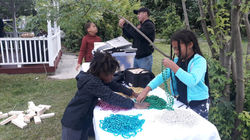
March 2024.....Register to vote!!
We remember Selma to Montgomery

The Selma to Montgomery marches were three protest marches, held in 1965, along the 54-mile (87 km) highway from Selma, Alabama, to the state capital of Montgomery.
The marches were organized by nonviolent activists to demonstrate the desire of African-American citizens to exercise their constitutional right to vote, in defiance of segregationist repression; they were part of a broader voting rights movement underway in Selma and throughout the American South. By highlighting racial injustice, they contributed to passage that year of the Voting Rights Act, a landmark federal achievement of the civil rights movement.
The first march took place on March 7, 1965, led by figures including Bevel and Amelia Boynton, but was ended by state troopers and county possemen, who charged on about 600 unarmed protesters with batons and tear gas after they crossed the Edmund Pettus Bridge in the direction of Montgomery. The event became known as Bloody Sunday.
The second march took place two days later but King cut it short as a federal court issued a temporary injunction against further marches. That night, an anti-civil rights group murdered civil rights activist James Reeb, a Unitarian Universalist minister from Boston.
The third Selma march received national and international coverage. It was reported that it publicized the marchers' message without harassment by police and segregation supporters. Gaining more widespread support from other civil rights organizations in the area, this third march was considered an overall success, with greater degree of influence on the public. Subsequently, voter registration drives were organized in black-majority areas across the South, but it took time to get the target population to sign up.
The efforts of civil rights and voting rights in the south, in no doubt, benefitted all humans nationwide!
March is for Black People
Crispus Attucks Day
Harriet Tubman Day
First Black Newspaper Debut
International Day for the elimination of racial discrimination

Black Consciousness Day on November 20, is a preeminent day in Brazil, set aside to commemorate Zumbi’s death — the pioneering leader of resistance to slavery — and to reflect on the tragic injustices imposed on the Black community and African descendants since the beginning of time. This day is a social movement, dedicated to recognizing the worth and unmatched contributions of the Black people in the country, by honoring their existence, and protesting against racial discrimination on a massive scale. Black Consciousness Day is a public holiday in and around hundreds of cities in Brazil.
Learn to change racial expressions — and tell everyone
This will take some guts. Kickstart the trend of mentioning one ‘racist’ expression, such as “blacklist,” on your social media and encourage its replacement with “forbidden list” to remove the connotation with the color black. “Black market,” “black sheep” — you get it?
Holiday Information
This page is a compilation of information we posted throughout the year on Black/African contributions to the respective holiday
Veterans Day was created as “Armistice Day” on November 11, 1919, the first anniversary of the end of World War I. It became a national holiday by an act of Congress in 1938.
It is up to us to remember and honor our own, in spite of what this nation does or how it seeks to change or erase the history that we bled and sacrificed to build. Yes, this Veterans Day, let’s remember our own; and not by running out to catch the latest sales. How about reflecting on how we can individually build on what they left? Things like registering to vote, spending money with those who support us, demanding respect for ourselves and our elders, and remembering that we are still “Black” to America whether we are rich, poor, educated, homeless, or ignorant.
We must honor ourselves before we can demand that others do so.

Black origins of Memorial Day
Memorial Day has long been known as a holiday to celebrate and honor America’s soldiers. It’s also the day that officially kicks off summer, a seasonal beginning that is typically celebrated with cookouts, picnics and fun in the sun. And, to some of our delight, it also represents the return of white shoes, pants and dresses.
While most of those traditions are beginning to return to normal as the coronavirus pandemic inches toward being under control in the U.S., one thing COVID-19 cannot do is erase the very real Black history behind the Memorial Day federal holiday.
& Afro-Mexican History,
5 Things You May Not Know
#1 Around 200,000 Africans were brought to Mexico during the slave trade
#2 Gaspar Yanga is a national hero
#3 Pio Pico, the last Mexican governor of Alta California (now the state of California) had African, Native American, and Spanish Ancestry.
#4 There are 1.4 million Afro-Mexicans in the country today
#5 Black Mexicans still face racism
Cinco de Mayo
Juneteenth
Flag Raising, 18 June
Pics
 |
|---|
 |
 |
 |
 |
 |
 |
 |
 |
 |
 |
 |
 |
 |
 |
 |
 |
 |
 |
 |
 |
 |
 |
 |
 |
 |
 |
 |
 |
 |
 |
 |
 |
 |
 |
 |
 |
JUNE is Black Music Month
Juneteenth
Celebration, 19 Jun
Pics
 |
|---|
 |
 |
 |
 |
 |
 |
 |
 |
 |
 |
 |
 |
 |
 |
 |
 |
 |
 |
 |
 |
 |
 |
 |
 |
 |
 |
 |
 |
 |
 |
 |
 |
 |
 |
 |
 |
 |
 |
 |
 |
 |
 |
 |
 |
 |
 |
 |
 |
 |
 |
 |
 |
 |
 |
 |
 |
 |
 |
 |
 |
 |
 |
 |
 |
 |
 |
 |
 |
 |
 |
 |
 |
 |
 |
 |
 |
 |
 |
 |
 |
 |
 |
 |
 |
 |
 |
 |
 |
 |
 |
 |
 |
 |
 |
 |
 |
 |
 |
 |
 |
 |
 |
 |
 |
 |
 |
 |
 |
 |
 |
 |
 |
 |
 |
 |
 |
 |
 |
 |
 |
 |
 |
 |
 |
 |
 |
 |
 |
 |
 |
 |
 |
 |
 |
 |
 |
 |
 |
 |
 |
 |
 |
JUNETEENTH
(now a Federal Holiday)
BLACK AUGUST is an acknowledgment and commemoration of the countless organizers, activists, and freedom fighters who sacrificed their freedom and lives in the struggle for Black liberation.
Black August takes place during the month of August, and was started in California prisons in the 1970s by Black freedom fighters who wanted to honor the lives and deaths of Black political prisoners killed by the state, bring awareness to prison conditions, and to honor the radical tradition of Black resistance against anti-Black state violence and systemic oppression.
CLICK ON PIC
Akyaaba Addai-Sebo, who set up Black History Month in the UK, chose October because it falls in line with the start of the academic year and so would inspire the UK's young people who would be freshly back from the summer holidays.
This national celebration aims to promote and celebrate Black contributions to British society, and to foster an understanding of Black history in general.
Its origins go back to the 1920s and the establishment of Negro History Week in the United States.




